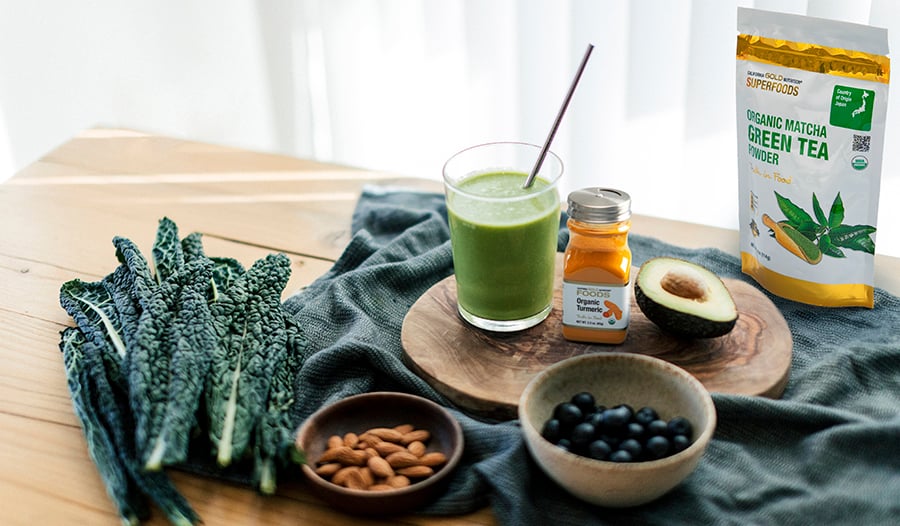 What is a Superfood?
What is a Superfood?
While there isn’t a strict definition of what a superfood is, the term most often refers to nutrient-rich foods that are considered to be especially beneficial for health and well-being, including for healthy immune system support.
Some examples of such superfoods include leafy greens like kale, berries, salmon, garlic, and herbs like turmeric.
What Makes a Superfood a Superfood?
What makes these foods so special? For starters, they provide a concentrated dose of essential nutrients—such as vitamins, minerals, antioxidants, fiber, and fatty acids—which you must obtain from your diet since your body can’t make these nutrients on its own.
When it comes to immune system health, superfoods that contain nutrients like vitamin C and probiotics seem to be especially helpful.
If you normally eat a “clean diet,” meaning you avoid processed foods and opt for whole foods, then you’re likely already eating some superfoods regularly. However, there’s always room for improvement, so let’s look below at some of the best superfoods for maintaining a strong and healthy immune system.
Best Superfoods for Immune System Health
Superfoods can help take a balanced diet to the next level because they’re chock full of antioxidants, phytonutrients, and other compounds that boost your body’s ability to defend itself via the immune system.
Another way in which they support gut and immune system health—which are highly connected—is by providing fiber and probiotics, which are “friendly bacteria” that help support overall health.
Additionally, many superfoods like vegetables and fruits have a high water content, which means they help support proper hydration, plus they are typically low in calories, helping to keep your appetite and waistline in check.
Where should you start? To help strengthen your healthy immune system, try to “eat the rainbow” by including a variety of different colored foods in your diet, which indicates you’re obtaining different nutrients.
Begin by adding these 12 superfoods to your meals more regularly: (Of course, you should always consult your healthcare professional prior to starting any new dietary or lifestyle regimen.)
1. Leafy Greens Like Kale
Leafy greens (such as arugula, kale, collard greens, spinach, lettuce, and Swiss chard) are loaded with phytonutrients that support strong immune defenses, as well as vitamin C, vitamin A, calcium, fiber, and more.
These veggies are among the best at boosting antioxidant defenses and promoting a healthy inflammation response. They also support detoxification, digestion, and potentially even healthy weight management.
2. Blueberries And Other Berries
Much like greens, berries are superstars when it comes to their supply of vitamin C, antioxidants like polyphenols and anthocyanin, fiber, and vitamin A. They can help defend against free radical damage that can damage bodily tissues, plus they’re linked with heart and gut support.
3. Yogurt
Yogurt (and its cousin kefir) are one of the best dietary sources of probiotics, which support immune health by balancing the ratio of microbes living in the gut and helping with digestion and elimination.
4. Citrus Fruits
Fruits like oranges, grapefruit, lemons, and limes are very high in vitamin C, which can help promote healthy immune defenses. Vitamin C also supports collagen protein in maintaining a strong gut lining. The gut is where the majority of your immune system resides.
5. Avocados
Avocado provides heart-healthy polyunsaturated and monounsaturated fats which your body needs for a variety of purposes, including for absorbing other vitamins and for keeping your energy up. This fruit (yes, technically a fruit) is also full of fiber, potassium, magnesium and even some antioxidants that support healthy blood flow, muscle function and more.
6. Broccoli And Other Cruciferous Veggies
Veggies in the Brassica/cruciferous family including broccoli, Brussels sprouts, bok choy, cauliflower, and cabbage are great sources of protective compounds including glucosinolates, which fight oxidative stress and help maintain a healthy balance of microbes in the gut.
7. Salmon
Salmon is an ideal protein source because it’s high in not only amino acids, which help build your gut lining and other tissues, but also omega-3 fatty acids that promote a healthy inflammation response.
8. Onions
These tasty veggies—as well as related types like chives, garlic, and leeks—have natural beneficial properties thanks to sulfur compounds they contain, as well as antioxidants like alliinase and quercetin.
9. Garlic
Garlic, especially when eaten raw, provides you with unique and powerful compounds including allicin and disulfides that fight harmful bacteria and offer antioxidant effects.
10. Flaxseeds
As a great source of fiber and healthy fats, flax seeds contribute to gut health by “feeding” beneficial bacteria in the gut and by helping with elimination.
11. Green Tea
Green tea is a top source of antioxidants including EGCG, which can ward off oxidative stress, give you a boost in energy when you’re feeling run down, and support a generally healthy metabolism.
12. Turmeric
Turmeric contains the active ingredient called curcumin, which promotes a healthy inflammation response. Not only this, but it offers other potential benefits for joints, skin, and cognitive health, especially when paired with black pepper which improves absorption of turmeric’s compounds.
Comments
Post a Comment